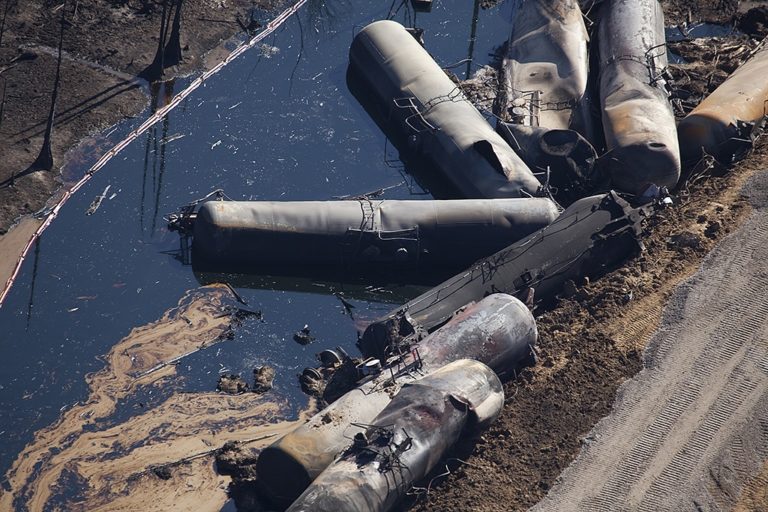Waterkeeper Alliance Pushes for Meaningful Oil Tank Car Safety Regulations
By: Waterkeeper Alliance

New DOT Rule Fails to Provide Meaningful Protections
May 14, 2015, New York, NY — Waterkeeper Alliance and Spokane Riverkeeper today joined other environmental groups in challenging the U.S Department of Transportation’s inappropriately weak safety standards for oil trains. As the transportation of oil by rail has vastly increased in recent years, so have the risks to communities and waterways from spills, fires, and explosions that occur when oil trains derail. The shipment of oil by train has grown from fewer than 10,000 carloads in 2008 to over 400,000 carloads in 2013, an increase of more than 4,000 percent.
Waterkeeper Alliance is particularly concerned about the inadequacy of the newly proposed explosive tank car rules because oil trains present a significant risk to waterways. They run next to and over waterways while carrying millions of gallons of oil in a single train. Just a single punctured rail tank car can release around 30,000 gallons of oil. Even a relatively small oil spill into a waterbody can devastate the aquatic ecosystem, make it unsafe to swim in the water, and contaminate drinking water. This, along with other factors, including dangerously flimsy tank cars, unsafe train length and speed, and deteriorating rail infrastructure, has lead to an increasing number of derailments involving oil spills, explosions, fires, and water contamination.
In fact, more oil spilled on the rails in 2013 than in the previous 37 years combined. The most tragic of these incidents took place in in Lac Mégantic, Quebec, when sixty-three tank cars carrying Bakken crude exploded and spilled oil, killing 47 people, destroying the downtown, and contaminating two rivers and Mégantic Lake. In the past two years, fiery train derailments occurred on the James River in Virginia, the Kanawha River in West Virginia, and in a swamp connected to the Tombigbee River in Alabama. There have already been five major train derailments in North America in 2015.
The Department of Transportation’s new rule fails to provide meaningful protections in several major ways, including allowing for a ten-year phase-out of the use of the most dangerous tank cars, DOT-111s and CPC-1232s, for the transportation of volatile Bakken and tar sands crude oil. When oil is transported in trains containing less than 35 tank cars of oil, the dangerous tank cars can continue to be used indefinitely.
“In a step backwards, the rule allows oil companies to avoid giving the public and emergency responders important information about the explosive oil trains traveling through their communities,” said Larissa Liebmann, staff attorney for Waterkeeper Alliance. “It also applied a 40 mile-per-hour speed limit only to oil trains going through a few dozen select cities.”
In light of the continued danger posed by poorly regulated oil-by-rail transport, Waterkeeper Alliance filed a petition challenging the legality of these weak standards. “Explosive oil trains present a real and imminent danger, and protecting the public and waterways requires an aggressive regulatory response,” said Marc Yaggi, Executive Director of Waterkeeper Alliance. “Instead, the Department of Transportation has finalized an inadequate rule that clearly was influenced by industry and will not prevent more explosions and fires in our communities. We hope our challenge will result in a rule that puts the safety of people and their waterways first.”
Contact:
Larissa Liebmann, 212-747-0622 ext. 122, [email protected]